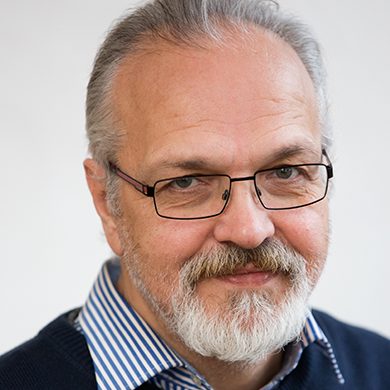3D bioprinting and regenerative medicine
This course is aimed at students and professionals of Health Sciences with interest in the application of bioprinting and 3D manufacturing techniques in the field of medicine. The course will explore the opportunities offered by manufacturing technologies in the development of biomedical applications of different levels of complexity. The fundamentals concepts of 3D bioprinting and the devices used for biofabrication will be covered during the course. Moreover, the course will also review most recent techniques for 3D bioprinting design and the challenges to achieve high-fidelity biofabrication. This includes the development of bioinks with specific characteristics and unique processing conditions. Additionally, the biological aspects of the interaction of bioinks with different types of cells and specifically with stem cells will be discussed.
Main Instructor:
Vladimir Mironov is the Chief Scientific Officer at 3D Bioprinting Solutions and Leading Scientist at Regenerative Medicine Institute of the Moscow Sechenov Medical University, Russia. He received his Bachelor degree in Medicine at Ivanovo State Medical Institute and his PhD in Developmental Biology from Second Moscow Pirogov Medical Institute. He has worked at the Department of Anatomy and Regenerative Medicine and Advanced Tissue Biofabrication Center in the Medical University of South Carolina in Charleston, USA and at the Division of 3D Technologies of Renato Archer Institute for Information Technology at Campinas, Brazil. Mironov is one of the pioneers of 3D bioprinting technology, he bioprinted the first functional and vascularized organ construct, a mouse thyroid gland. He was the recipient of the prestigious 2018 Senior Investigation Award from the International Society of biofabrication for pioneering contribution to the development of 3D bioprinting technology. Last year his team performed the first magnetic levitational bioassembly of a 3D tissue construct at the International Space Station. Click here to see the course brochure.

Support Instructors:
Support Instructors | Work Area |
|---|---|
Carolina Muñoz Camargo | Assistant professor at the Department of Biomedical Engineering at Universidad de los Andes, Bogota, Colombia. |
Juan Carlos Cruz | Assistant professor at the Department of Biomedical Engineering at Universidad de los Andes, Bogota, Colombia. |
Lorena Castro | Assistant professor at the Department of Biological Sciences at Universidad de los Andes, Bogota, Colombia. |
Karem Noris | Scientific and Laboratory Director at BioXacellarator. |
Orlando Chaparro | Full professor in the School of Medicine at Universidad Nacional de Colombia, Bogota Campus. |
CELLINK | 3D Bioprinting company and also the first bioink company in the world offering bioprinters, bioinks & more in Bioprinting. |
Course Content:
Course Content |
|---|
Bioprinting as an Information Technology. STL files and softwares |
Biological aspects of 3D Bioprinting and Biofabrication. Tissue spheroids and organoids. |
Engineering aspects of 3D bioprinting and Biofabrication. Bioprinters. |
Biomaterial aspects of 3D Bioprinting. Bioink. |
Inkjet Bioprinting. |
Extrusion-based Bioprinting. |
Laser-based Bioprinting. |
Magnetic and acoustic levitational biofabrication. Emerging of Formative Biofabrication: from Scaffolds to Scaffields. |
Organ printing. Bioprinting in Space. |
Commercialization of 3D Bioprinting technology. Emerging Business Models. Commercial 3D bioprinters. New emerging trends in 3D bioprinting (Hybrid Bioprinting, In situ 3D bioprinting, 4D bioprinting). |
Electrospinning. |
Biological aspects of cell-bioink interactions. |
Materials science aspects for the rational design of bioinks. |
Stem cells and biofabrication. |
Para estudiantes Uniandinos
Estudiantes de pregrado IBIO: Estos cursos tienen tarifa especial (igual que un curso de vacaciones de 3 créditos), deben inscribirse en las mismas fechas que los cursos de vacaciones y seguir el proceso de matrícula. Costos y pasos de inscripción aquí.
Estudiantes de maestría en IBIO: Estos cursos tienen el mismo costo que una materia de maestría durante el semestre, deben inscribirse en las mismas fechas que los cursos de vacaciones y seguir el proceso de matrícula.
Registro por Educación Continuada (estudiantes y externos)
Importante: Los cursos de la Escuela de Verano pueden tomarse en la modalidad de Educación Continuada. Está modalidad únicamente otorga certificado de asistencia y no da lugar a nota ni a reconocimiento de créditos. Inscríbase por Educación Continuada aquí.